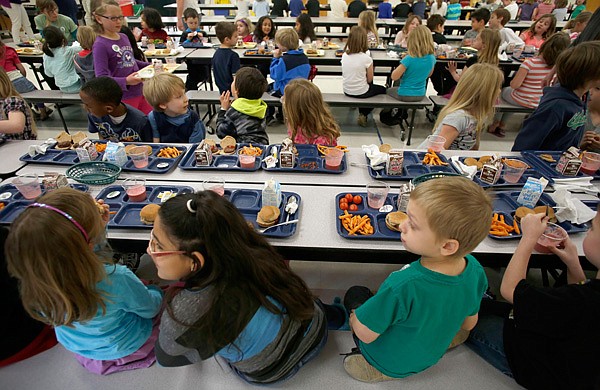Fayetteville Appeals To Students To Sign Up For Free, Reduced Meals
Parents Could Save $700 Or More On Food Costs
Students at lunch March 14 at Root Elementary School in Fayetteville. Fayetteville School District is appealing to to eligible families to register their children for free and reduced-price meals.
Thursday, July 4, 2013
FAYETTEVILLE — The School District wants more students to sign up for the free and reduced-price meal program.
The district is sending postcards to eligible families encouraging them to register their children.
Superintendent Vicki Thomas estimated 15 percent of the eligible students haven’t applied.
Some 41 percent, nearly 3,700, of the district’s 9,000 students, received the assistance last school year. An additional 15 percent could add 1,300 students.
At A Glance
National School Lunch Program
The National School Lunch Program is a federally assisted meal program operating in over 100,000 public and nonprofit private schools and residential child care institutions. It provided nutritionally balanced, low-cost healthy meals to more than 31 million children each school day in 2011.
Source: http://www.fns.usda.gov/cnd/lunch/aboutlunch/nslpfactsheet.pdf
The School Board recently approved placing an application form on the district’s website to make it easier for families to apply.
Susan Norton, chief information officer, said the state Department of Education is reviewing the form. “The department wants to make sure it’s a secure system,” Norton said. The department and the state School Boards Association wrote the policy the board approved for use of the online application, Norton said.
Norton said she didn’t know how long the approval process will be but estimated it would be later this summer.
The percentage of students who qualify for the federal program is considered a measurement of poverty in public schools.
Thomas said getting more students in the program is a win-win for families and the district.
Parents can save about $700 per child for free breakfasts and lunches in a school year, Thomas said. With several children in the family, the savings could add up significantly, Thomas added.
If more students enroll in the program it means more federal dollars come into the district. That money can be used to provide support in reading or math for struggling students, Thomas said.
Fayetteville received about $1.6 million in National School Lunch Act money for the fiscal 2012-13 which ended June 30, according to the Annual Statistical Report by the Department of Education.
Eligibility is determined by household income and the number of children in the household. For example, two children can receive free meals if they are in a household with an annual income of $20,163, which is 130 percent of the federal poverty guideline, according to the state Department of Education Child Nutrition Unit. Two children qualify for reduced-price meals if the household annual income is $28,694, which is 185 percent of federal poverty guideline of $15,510.
The federal government reimburses districts for the number of reduced-price and free meals served daily.
Students in Fayetteville who qualify for reduced-price meals pay 40 cents for lunch. Full price lunch is $2.25 at the elementary level and $2.50 at the junior high schools and high school.
The School Lunch Act money, which supports the free and reduced price meal program, is allocated to states and then doled out to districts, based on the percentage of students who qualify for the program. Legislation to change the distribution formula didn't get through the Legislature earlier this year and was referred to interim study.
Fayetteville stood to lose about $1 million if the legislation had passed. The formula gives more weight to the percentage of students who qualify for free meals.
In a related matter, the district is losing Title I federal money because of budget cuts. That money is used for services for economically disadvantaged students. Fayetteville received about $2.3 million in Title I funding last year. The district will receive about $300,000 less in the fiscal year that began Monday.
